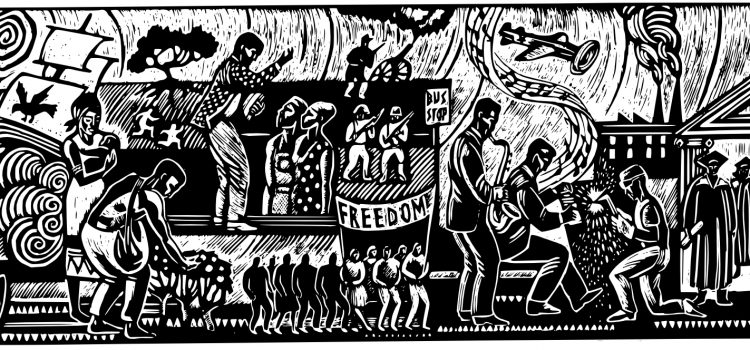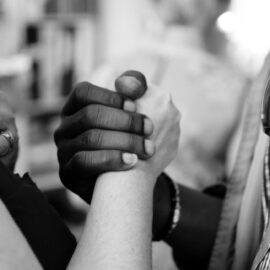

This article is an excerpt from the Shortform book guide to "Blackout" by Candace Owens. Shortform has the world's best summaries and analyses of books you should be reading.
Like this article? Sign up for a free trial here.
When and where did slavery start? What was life in Africa like for people before they were sold into slavery? Were American slave owners Republicans?
According to Candace Owens, slavery must be properly understood before the political progression of Black Americans can be understood. In Blackout, she discusses how Black Africans came to be in America and dispels some of the narratives that surround this history.
Keep reading to learn the myths and truths about the Atlantic slave trade of the 16th to the 19th centuries.
Candace Owens Dispels Slavery Myths
According to Candace Owens, slavery is undeniably horrific. That is not in dispute. However, she argues that several myths about the Atlantic slave trade affect current political policy—especially reparations. She insists that, if we have an accurate understanding of slavery, we wouldn’t support the Democratic push for reparations.
(Shortform note: Reparations are a compensatory form of restitution from the federal government to living descendants of former slaves. The push for and against reparations has been around for decades and continues to this day. Proponents of reparations argue that they are a way to atone for slavery and the oppression that followed. They also believe it will help boost the economic welfare of current and future generations of Black Americans. Opponents disagree with reparations on two grounds: moral and financial. In general, they believe that because living Black Americans were never slaves, and living white Americans were never slave owners, it’s not the latter’s obligation to repay the former—especially if it requires a federal tax increase.)
Myth & Truth #1
The myth: Slavery began in America with white men.
Owens says that most American children are taught in school that slavery began with colonial white men in America and that this belief feeds the toxic narrative that white men are historically evil and should forever owe a debt because of it.
The truth: Slavery has existed everywhere in the world since humanity began.
According to Owens, even Native Americans practiced slavery centuries before white Europeans arrived on the continent. Owens calls out the double standard that slavery is forgiven if it was brown-skinned people enslaving other brown-skinned people or brown-skinned people enslaving white-skinned people but that we continue to punish white people for doing the exact same thing.
(Shortform note: African slaves were first brought to the British colonies in America in 1619, about a hundred years after the trans-Atlantic slave trade began. By the time the slave trade ended in the late 1800s, around 12 million Africans had been uprooted. Of all the countries that imported slaves, the U.S. took in the fewest—around 300,000 slaves were taken to mainland North America, one million went to Spain, three million went to Great Britain, and nearly six million went to Brazil. These numbers support Owens’s argument that white Americans were neither the first nor the largest participants in slavery, but critics would argue that this defense is a form of “whataboutism”—a logical fallacy that deflects responsibility by pointing to a seemingly worse offense committed by someone else.)
Myth & Truth #2
The myth: Africans who were taken in the slave trade were living wealthy and sometimes regal lives before they were snatched and chained by Americans.
Owens says that it’s a common perception that today’s Black Americans suffer economically because they’ve spent generations trying to climb their way back up to the comfortable, or even prosperous, lifestyle that their African ancestors once enjoyed in the motherland.
The truth: The descendants of slaves are better off now than if their ancestors had stayed in Africa.
Owens says that wealthy Africans were not the ones being sold into the slave trade. Rather, commoners were sold into slavery by other Africans in exchange for basic necessities. Not only were the slaves not well-off to begin with, she says, but Africans today are still enslaved, while American Blacks have their freedom. According to Owens, there are close to 700,000 slaves in Africa today. In fact, along Lake Volta in Ghana, 20,000 children are enslaved by their own people. Activist Colin Kaepernick visited this country in protest of America’s Independence Day in 2017, which Owens says is hypocrisy at its finest.
(Shortform note: The argument that descendants of slaves have better lives now for having been brought to America inspires debate over the Machiavellian principle of “the ends justifying the means.” In this philosophical viewpoint, a positive end result outweighs any negative methods used to achieve it. In other words, we can forgive slavery if it ultimately achieved a better life for those who descended from it. The “end” is rarely defined, however, so to use this argument would be to judge actions and results based solely on present-day conditions, which are ever-changing.)
Myth & Truth #3
The myth: Republicans owned slaves.
Owens says that people who are the most ignorant of history still believe that Republicans are racist against Blacks and were the ones who owned slaves.
The truth: It was Southern Democrats who owned slaves.
Just before the Civil War, about four million Blacks were enslaved to Democrats. Their reason for owning slaves was based purely on greed—African slaves were free labor for Southern plantations. Furthermore, to keep the slaves from uniting and rebelling, and therefore ensuring the continuation of free labor, Democrats dissolved family units and deprived slaves of education. These are two tactics that Owens says Democrats continue to use on Black Americans today.
| The Democrat-Republican Party Switch Owens uses references to the Democratic Party and Republican Party as touchstones throughout this text. However, when interpreting a political party’s values, it’s important to consider each party’s ideologies at different points in time rather than rely on their names alone. Party names and values, including their level of conservatism or liberalism, have continuously morphed throughout history, and the Democratic and Republican parties are no exception. In what’s known as the “Great Party Switch,” many of the ideologies of the Democratic and Republican parties reversed beginning in the early 1900s and peaking during the Civil Rights Movement. The most dramatic reversal in voting patterns happened during the 1963 presidential election between Barry Goldwater (a Republican) and Lyndon B. Johnson (a Democrat). Johnson was in favor of the Civil Rights Act and Goldwater was against it. Southern Democrats were so against the Civil Rights Act that they turned their loyalties over to the Republican Party, and for the same reason, Black Americans cemented their support for the Democratic Party. So while Southern Democrats were the slave-owning party, this same population (a few generations removed) became the Republicans who voted against the Civil Rights Act of 1964. |

———End of Preview———
Like what you just read? Read the rest of the world's best book summary and analysis of Candace Owens's "Blackout" at Shortform.
Here's what you'll find in our full Blackout summary:
- How the Democratic Party has been keeping Blacks poor and needy for political gain
- How Democratic policies have destroyed the nuclear family
- Why Black Democrats should jump ship and join the Republicans






